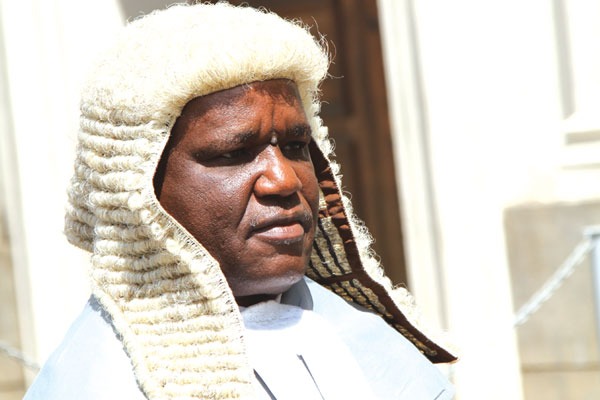
JUDGES yesterday all but confirmed long-held claims of judicial capture, in a letter to President Emmerson Mnangagwa complaining of interference in the discharge of their duties by Chief Justice Luke Malaba.
BY RICHARD MUPONDE/MOSES MATENGA
The letter, dated October 26, comes after High Court judge Justice Erica Ndewere, who is battling suspension over allegations of gross incompetence, claimed in court papers that she was being victimised for refusing to take orders from Chief Justice Malaba to deny former Tourism minister Priscah Mupfumira and MDC Alliance deputy chairman Job Sikhala bail.
In the latter, signed off as “Your long suffering judges” and copied to the Zimbabwe Anti-Corruption Commission and the Attorney-General Prince Machaya, the judges said the Chief Justice was interfering with their work and judgments.
They said they were now operating in fear of being victimised.
“What is repeated in the public domain and on social media about the capture of the Judiciary is no longer fiction or perception, it is in fact reality,” the letter read in part.
The letter also accused Chief Justice Malaba of interfering with decisions made by magistrates through the office of the Chief Magistrate.
“At the superior courts, it is an open secret that judges no longer enjoy any respect and that administrative staff now spy on judges and report to the various registrars, who in turn make reports to the Judicial Service Commission secretariat for onward reporting to the Chief Justice,” the letter read in part.
- Chamisa under fire over US$120K donation
- Mavhunga puts DeMbare into Chibuku quarterfinals
- Pension funds bet on Cabora Bassa oilfields
- Councils defy govt fire tender directive
Keep Reading
The judges said they had lost trust in their supporting staff, describing them as spies.
They claimed they were resorting to hiding their judgments for fear of being directed to change them.
According to the judges, they are being pushed into making “safe” judgments to protect their jobs, a claim that confirmed fears of interference and capture of the Judiciary often raised mainly by the opposition MDC Alliance and activists.
Prosecutors, the judges claimed, have become the “new judicial officers” and report to structures outside the court processes.
“Any attempts to protect the interests of accused persons and other litigants are promptly reported to the Chief Justice’s office, who thereafter directs heads of the various courts/divisions to investigate these.
“Judges are, therefore, now so afraid of their own jobs that they consciously and subconsciously make decisions that they consider ‘safe’, even if these do not accord with the law,” the letter read in part.
Chief Justice Malaba, the judges alleged, is interfering with judgments by ordering judges to rewrite judgments, adding that no judgment is passed without his approval.
“It is an open secret that no Supreme Court judgment can be delivered without the Chief Justice’s approval,” the judges allege.
“It is also an open secret and a source of much disquiet that all draft judgments in the Supreme Court are circulated among all the judges, including those who did not hear arguments on the matter. Judges who did not hear arguments on a particular case can influence the result without having even read the record.”
Chief Justice Malaba touched off a storm in July after he ordered all High Court and Labour Court judges to submit their judgments for approval before they were handed down. He was forced to reverse the directive after an outcry from international jurists.
The judges also complained of their conditions of service, arguing that they were receiving “worthless” Real Time Gross Settlement fuel coupons, forcing their drivers to “burn more fuel” in search of garages accepting local coupons.
On salaries, the judges said even newly-qualified lawyers now earn more than them, making it impossible to properly dispense justice as they are now “constantly worrying about day-to-day family issues”.
Several allegations were made by the judges which the NewsDay could not immediately verify.
Presidential spokesperson George Charamba could not confirm nor deny the authenticity of the letter to his boss, saying: “We don’t comment on such issues.”
Pressed further, Charamba said: “I would have commented if I say anything on that.”
Justice, Legal and Parliamentary Affairs permanent secretary Virginia Mabiza said: “The letter is unsigned and also presented in a language that is not consistent with judicial language.
“I am suspicious it could be emanating from street activists. Our judges have integrity and cannot stoop to such levels. It would appear someone is scandalising the Judiciary. Anyway, it happens in a democratic society,” Mabiza said.
Mabiza later promised a detailed response on the matter, which had not been sent through by the time of going to print last night.
During a question-and-answer session in Parliament yesterday, Sikhala asked Justice minister Ziyambi Ziyambi what government was doing about allegations of judicial interference.
“Section 164 of the Constitution guarantees the independence of the Judiciary in our country,” Sikhala said, referring to the letter by the judges.
“What is your ministry doing, vis-a-vis issues of interference on the judicial officers in the country, so that you reassure the public that members of the Judiciary are, indeed, independent and that you will continue supporting their independence?”
But Ziyambi denied the allegations of judicial interference, saying judicial officers were free to do their work without fear of victimisation.
He also said the law provided judges with security of employment.
“I would also like Sikhala to fashion me with specific cases so that I can then study how there is interference in the functions of our Judiciary,” Ziyambi said.











